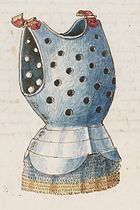Greave

A greave (from 12th century French greve "shin", of uncertain origin) is a piece of armour that protects the leg.
Often in matched pairs (a pair of greaves), greaves may be constructed of materials ranging from padded cloth to steel plate. Some designs protect only the lower leg (a half-greave) or extend upwards to protect the thigh.
Greaves are most commonly found in the armor of heavy infantry, usually from ancient times. Greek Hoplites wore a bronze greave on each leg. Triarii, the better equipped soldiers of the Roman Republic, wore greaves on both shins reminiscent of the Ancient Greeks. Principes and hastati often only wore one greave (on their left leg) or none. The Roman Centurions wore altered greaves from the standard Roman uniform. Later Imperial legionnaires did not wear greaves, except for the centurions who retained them.
In the Middle Ages greaves eventually developed to protect the back of the legs as well and these were called full greaves (the style which only covered the front became known as half-greaves or demi-greaves).
Greaves are also mentioned in the Old Testament identifying an article of armor worn by the giant Goliath (1 Sam 17:6)[1] as he fought David, the young Hebrew shepherd.


